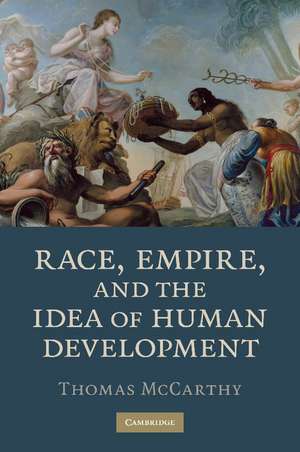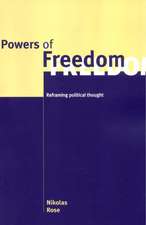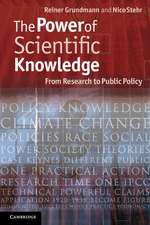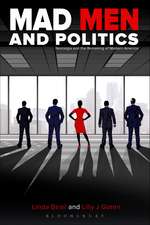Race, Empire, and the Idea of Human Development
Autor Thomas McCarthyen Limba Engleză Paperback – 15 iul 2009
| Toate formatele și edițiile | Preț | Express |
|---|---|---|
| Paperback (1) | 206.39 lei 6-8 săpt. | |
| Cambridge University Press – 15 iul 2009 | 206.39 lei 6-8 săpt. | |
| Hardback (1) | 639.10 lei 6-8 săpt. | |
| Cambridge University Press – 15 iul 2009 | 639.10 lei 6-8 săpt. |
Preț: 206.39 lei
Nou
Puncte Express: 310
Preț estimativ în valută:
39.50€ • 41.08$ • 33.05£
39.50€ • 41.08$ • 33.05£
Carte tipărită la comandă
Livrare economică 15-29 martie
Preluare comenzi: 021 569.72.76
Specificații
ISBN-13: 9780521740432
ISBN-10: 0521740436
Pagini: 264
Ilustrații: black & white illustrations
Dimensiuni: 150 x 226 x 13 mm
Greutate: 0.43 kg
Editura: Cambridge University Press
Colecția Cambridge University Press
Locul publicării:Cambridge, United Kingdom
ISBN-10: 0521740436
Pagini: 264
Ilustrații: black & white illustrations
Dimensiuni: 150 x 226 x 13 mm
Greutate: 0.43 kg
Editura: Cambridge University Press
Colecția Cambridge University Press
Locul publicării:Cambridge, United Kingdom
Cuprins
Introduction; Part I: 1. Political philosophy and racial injustice: a preliminary note on methodology; 2. Kant on race and development; 3. Social Darwinism and white supremacy; 4. Coming to terms with the past: on the politics of the memory of slavery; Part II: 5. What may we hope? Reflections on the idea of universal history in the wake of Kant; 6. Liberal imperialism and the dilemma of development; 7. From modernism to messianism: reflections on the state of 'development'; Conclusion: the presence of the past.
Recenzii
'With a first systematic account of racisms and penetrating criticisms of developmental schemes, this brilliant and beautifully written book is a milestone in the Frankfurt tradition of critical social theory. It provides at the same time a pathbreaking analysis of what should be saved, 'after progress', from developmental thought.' Jürgen Habermas
'Global development in an interdependent world is one of the leading ideas of our times. But neoliberal globalizers on the one hand and neconservative interventionists on the other obscure how such developmental visions can foster ideologies of neoracism and neo-colonialism. In this comprehensive work, which ranges from Enlightenment race theories to Kant's philosophy of history, from social Darwinism to the politics of memory, Thomas McCarthy outlines a critical theory of global development which is universalist as well as multiculturalist; critical of Eurocentrism but supporting the binding legacy of practical reason as developed since the Enlightenment. A must reading for all those who want to see critical social theory at work in our times.' Seyla Benhabib, Yale University
'Thomas McCarthy has written a splendid book, an immediately indispensable contribution to ongoing discussions of political philosophical method, racial injustice, liberal imperialism, and globalization. Empirically rich and richly insightful, it is a masterly exemplar of critical history with a practical intent and will be enthusiastically welcomed by all who would understand how racism and the rationalization of empire have shaped the modern world.' Robert Gooding-Williams, The University of Chicago
'Global development in an interdependent world is one of the leading ideas of our times. But neoliberal globalizers on the one hand and neconservative interventionists on the other obscure how such developmental visions can foster ideologies of neoracism and neo-colonialism. In this comprehensive work, which ranges from Enlightenment race theories to Kant's philosophy of history, from social Darwinism to the politics of memory, Thomas McCarthy outlines a critical theory of global development which is universalist as well as multiculturalist; critical of Eurocentrism but supporting the binding legacy of practical reason as developed since the Enlightenment. A must reading for all those who want to see critical social theory at work in our times.' Seyla Benhabib, Yale University
'Thomas McCarthy has written a splendid book, an immediately indispensable contribution to ongoing discussions of political philosophical method, racial injustice, liberal imperialism, and globalization. Empirically rich and richly insightful, it is a masterly exemplar of critical history with a practical intent and will be enthusiastically welcomed by all who would understand how racism and the rationalization of empire have shaped the modern world.' Robert Gooding-Williams, The University of Chicago
Notă biografică
Descriere
Examines racism and imperialism in the modern world order, arguing that both remain a fundamental part of Western hegemony.













